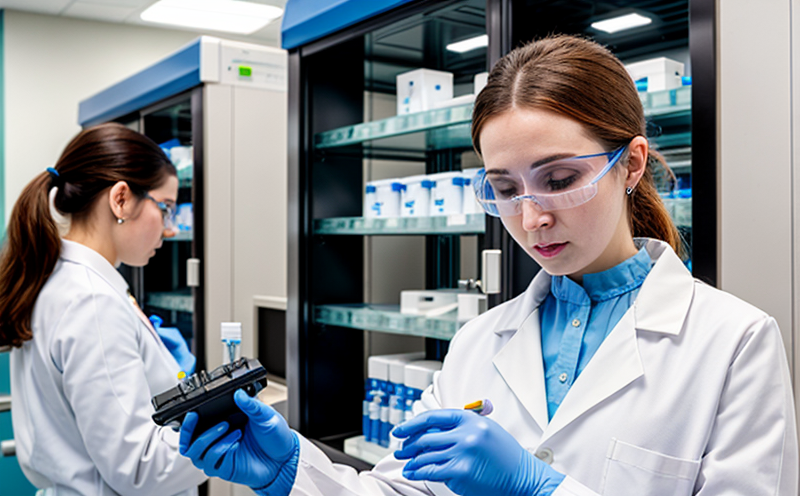Carryover Assessment Bioanalysis Testing
The carryover assessment in bioanalytical testing is a critical component of ensuring the integrity and reliability of analytical results. This process, also known as carryover contamination or cross-contamination control, aims to prevent residual analytes from previous samples from affecting subsequent analyses. In pharmaceutical testing, this is particularly important because even trace amounts of an active pharmaceutical ingredient (API) can lead to inaccurate drug product release assessments.
Carryover contamination can arise during the analytical process due to various factors such as insufficient cleaning procedures between sample runs, inadequate chromatographic column conditioning, or cross-contamination from pipetting. This issue is especially challenging in high-sensitivity bioanalytical methods where small quantities of analytes can significantly impact results.
At Eurolab, our approach to carryover assessment bioanalysis testing involves a multi-step process tailored to the specific requirements of pharmaceutical quality assurance and regulatory compliance. We employ advanced instrumentation such as liquid chromatography-tandem mass spectrometry (LC-MS/MS) to ensure high sensitivity and selectivity. Our team follows stringent protocols that include:
- Sample preparation using validated methods
- Cleanroom environments for sample handling
- Regular instrument calibration and validation
- Positive and negative controls
- Detailed documentation of all steps to ensure reproducibility
The importance of carryover assessment cannot be overstated. It ensures that the results of bioanalytical tests are accurate, reliable, and meet regulatory standards such as those set by the FDA and international guidelines like ISO 17025. By addressing potential sources of carryover contamination early in the analytical process, we help our clients maintain product quality and compliance.
In addition to the technical aspects, Eurolab ensures that all personnel involved in the testing are trained and certified according to industry best practices. This commitment to excellence is reflected in our adherence to international standards such as ISO 17025:2017, which governs the competence of testing and calibration laboratories.
To summarize, carryover assessment bioanalysis testing at Eurolab is more than just a compliance check; it is an integral part of our quality assurance framework. Our expertise in this area helps ensure that pharmaceutical products meet the highest standards of safety and efficacy.
Applied Standards
| Standard | Description |
|---|---|
| ISO 17025:2017 | Laboratory accreditation standard for testing and calibration laboratories. |
| USP 34-NF 29 | American Pharmaceutical Association's standards for pharmaceutical testing. |
| ICH Q5E | Guideline on bioanalytical method validation. |
| ICH Q2(R1) | Guideline for the development and testing of new drugs. |
Scope and Methodology
The scope of carryover assessment bioanalysis testing at Eurolab encompasses a comprehensive evaluation of potential contamination sources. This includes, but is not limited to, the following:
- Sample preparation and handling processes
- Cleaning protocols for analytical instruments
- Instrument calibration procedures
- Use of positive and negative controls in testing
- Data analysis and reporting
The methodology we employ is designed to cover all aspects of the bioanalytical process, ensuring that no potential source of carryover contamination is overlooked. Our approach is rooted in a deep understanding of the pharmaceutical sector, where precision and accuracy are paramount.
For instance, when dealing with complex matrices such as plasma or urine, we ensure that every step from sample collection to final analysis is conducted under controlled conditions. This includes using validated extraction methods and ensuring that all reagents are of high purity to minimize any interference. Our use of LC-MS/MS allows us to detect even trace amounts of analytes, making it an ideal tool for this type of testing.
The results obtained from our carryover assessment bioanalysis testing are detailed in comprehensive reports that include all relevant data and analyses performed. These reports serve as a valuable resource for quality managers and compliance officers, providing them with the information needed to make informed decisions about product development and regulatory submissions.
Eurolab Advantages
At Eurolab, we pride ourselves on offering unparalleled expertise in carryover assessment bioanalysis testing. Our advantages include:
- State-of-the-art instrumentation and facilities
- A team of highly skilled and certified professionals
- Comprehensive quality assurance protocols
- Adherence to the latest international standards
- Detailed reporting and documentation
- Customized solutions for specific client needs
Our commitment to excellence ensures that our clients can rely on us to provide accurate, reliable, and compliant results. Whether you are a quality manager, compliance officer, or R&D engineer, Eurolab is here to support your bioanalytical testing needs with the highest level of expertise.





